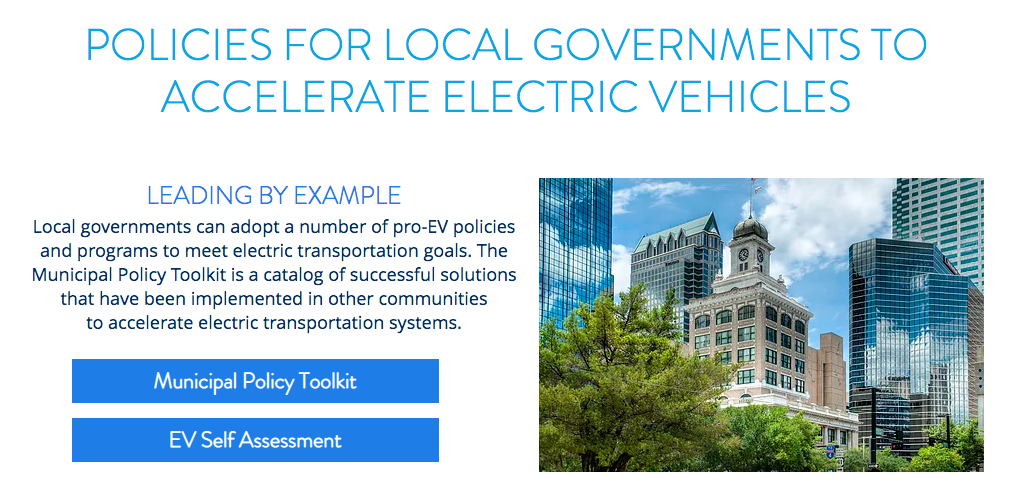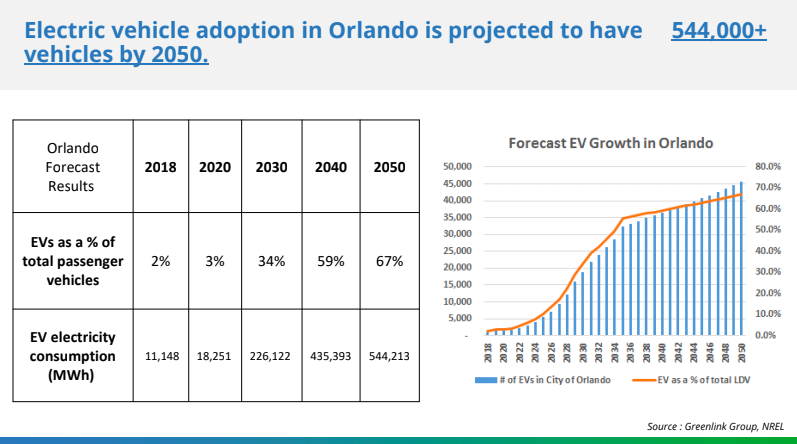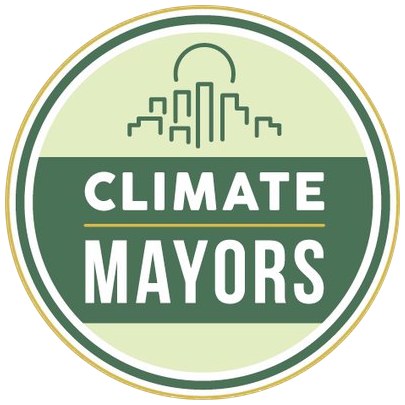The city of Coral Gables Sustainability Director Matt Anderson coordinated a webinar to discuss and share best practices and resources on “Green Fleets” through the Florida Sustainability Directors' Network.
Dory Larsen | September 24, 2019 | Clean Transportation, Electric Vehicles, FloridaThis past month, the city of Coral Gables, Florida’s Sustainability Director Matt Anderson coordinated a webinar to discuss and share best practices and resources on “Green Fleets.” Green fleets are those which are planned and managed with the goal of reducing fuel consumption and emissions. One of the most efficient ways to do both is to increase the number of electric vehicles in a fleet.
The webinar was intended for sustainability directors, fleet directors, and any additional city or county staff interested in transitioning to a green fleet. Presenting on the webinar were Dory Larsen, EV Program Coordinator with the Southern Alliance for Clean Energy (SACE); Jared Walker, the Technical Lead of Fleet Electrification at the Electrification Coalition; Chris Castro, Director, Office of Sustainability & Resilience with the City of Orlando; and Matt Anderson, Senior Sustainability Analyst and Steve Riley, Fleet Director with the City of Coral Gables.
Southern Alliance for Clean Energy: Municipal Policy Toolkit

Dory Larsen (SACE) presented on how SACE is engaging local governments in Florida to take action to protect our coast from the threats of offshore drilling and climate change by passing policies to accelerate the transition to electric vehicles (EVs), which can save drivers money and promote public health. Local governments can adopt a number of pro-EV policies and programs to meet electric transportation goals. The Municipal Policy Toolkit is a catalog of successful solutions that have been implemented in other communities – including links to Resolutions and Ordinances – that can be enacted to facilitate the transition to EVs in an effective, sustainable, and equitable way. This comprehensive approach has specific recommendations based on a compilation of local EV initiatives and effective policies from around the country with links to real-world examples. The objective is not to suggest that every city must implement all of these policy recommendations, but to encourage public officials to use this catalog as a menu of options to find solutions that best fit the needs of their communities as they develop their action plans.
Dory also shared the Driving on Sunshine EV Roadshow, through which SACE facilitates cities co-hosting EV events where participants can test drive an EV at no cost.
Electrification Coalition: Climate Mayors Purchasing Collaborative
Jared Walker (Electrification Coalition) shared information on the Climate Mayors EV Purchasing Collaborative (The Collaborative). The Collaborative, one of the many programs the Electrification Coalition is working on, provides a host of resources to assist cities/counties to achieve fleet electrification — including favorable prices on EVs. Through manufacturer-direct contracts, the Collaborative leverages municipalities’ collective purchasing power to lower the cost of EVs and charging stations for public entities. The Collaborative also allows municipalities to monetize a portion of the federal tax credit incentive for EVs, via an innovative EV-leasing option. Additionally, the Collaborative can help identify and prioritize which vehicles to transition first.
Thus far, 157 cities, counties, ports, and transit agencies have participated in the Collaborative, which has resulted in 2,391 EV purchase commitments by the end of 2020 – as well as 56 battery-electric buses! The impacts of the Collaborative are substantial. By 2021, these EV commitments have the potential to reduce gasoline usage by up to 1 million gallons each year; transition to 25 million electric miles driven each year; and add more than $75 million in purchasing power to the EV market.
City of Orlando: Overview of Orlando’s Green Fleet

Chris Castro (City of Orlando) presented on how the City of Orlando – which is a member of Energy Secure Cities Coalition and the Under 2 Degrees Coalition with the Climate Group (among many others) – is leading the way in clean transportation initiatives by embracing alternative transportation and mobility solutions including 350+ miles of sidewalks and bike paths, Lime & Hopr Bike Share, a SunRail Commuter Train, Zipcar, LYNX transit, Lymmo BRT, and coming soon: Scooters and Virgin Train.
The city’s fleet has an impressive number of EVs, including 15 Chevy Bolts and 6 Volts, 6 Nissan LEAFs, 1 Ford Focus EV, 1 ford C-Max, 4 Zero motorcycles, and 1 Orange EV Yard Dog. The city is adding 15 additional LEAFs and 15 Bolts (through the assistance of the Climate Mayors EV Purchasing Collaborative) as well as 4 additional Zero motorcycles and has an order placed for 100 electric Ford F-150s.
Orlando is projected to have over 544,000 EVs adopted by 2050, so the next step is to deploy additional charging stations around City parks, facilities, and public spaces. The city of Orlando currently has 34 new chargers planned, which will increase the number of EV chargers to 111. And they’re partnering with the Orlando Utilities Commission on two programs to boost deployment.
City of Coral Gables: Journey into Electric Vehicles and EV Charging Infrastructure
Matt Anderson (City of Coral Gables) shared the journey that Coral Gables has taken toward the electrification of their fleet and installation of charging infrastructure throughout the city. Coral Gables (located in Miami-Dade County) encompasses 14 sq. miles and has 50,000 residents and 264 miles of roadway. The City’s Ten-Year Sustainability Plan includes reducing fuel, energy, water & greenhouse gas emissions by 20% by 2025. Currently, Coral Gables has 53 EVs: 35 Nissan LEAFs and 18 Chevy Bolts – meaning that 10% of the city’s total fleet is electric! Their goal of 78 vehicles by 2021 would translate to 60% of the administrative fleet being electric. Public Works, Code Enforcement/Development Services, Parking (100% Electric), Procurement/Finance, Historical Resources, Police (Neighborhood Safety Aids), and Fire (Inspectors) all have EVs in their departments.
To power their fleet, Coral Gables has nine private charging stations. They also offer five Level II dual-port stations in pubic parking garages and two Level III at City Hall for the public to charge free of charge. The 11,000 charging sessions have saved 12,000 gallons of fuel and avoided 28,000 pounds of greenhouse gas emissions. They also have planned 11 more dual charging stations. Additionally, in March, the City has made changes to their Zoning Code which require new developments with 20 or more off-street spaces to have:
- two percent of their parking spaces be equipped with charging stations
- three percent of spaces be “EV Ready,” meaning all the necessary infrastructure is installed except the EV Station
- fifteen percent of spaces be “EV Capable” meaning that the conduit is run with enough capacity installed in the electrical panels.
Finally, Coral Gables’ Fleet Director Steve Riley shared his EV and EV Charging Infrastructure Implementation Guidelines, which is a great resource for communities considering transitioning their fleet.
The webinar had over 60 participants who heard best practices and lessons learned from communities that have been leaders on the topic. A recording of the webinar is here.
The Florida Sustainability Directors’ Network is a group of sustainability staff from across the state that has calls every other month to discuss best practices and share lessons learned. If you are a sustainability director and interested in participating in the Florida Sustainability Directors Network you can contact Matt Anderson.
SACE recognizes the importance of transitioning our transportation sector to electrification because it has become the largest source of carbon dioxide pollution. Electric vehicles have over 50% fewer emissions than a traditional vehicle. This varies depending on how the energy is sourced, but on average in the US electric vehicles now have greenhouse gas emissions equal to an 80 MPG car. That is why they are such a critical component of fighting climate change. Join us in our efforts.
